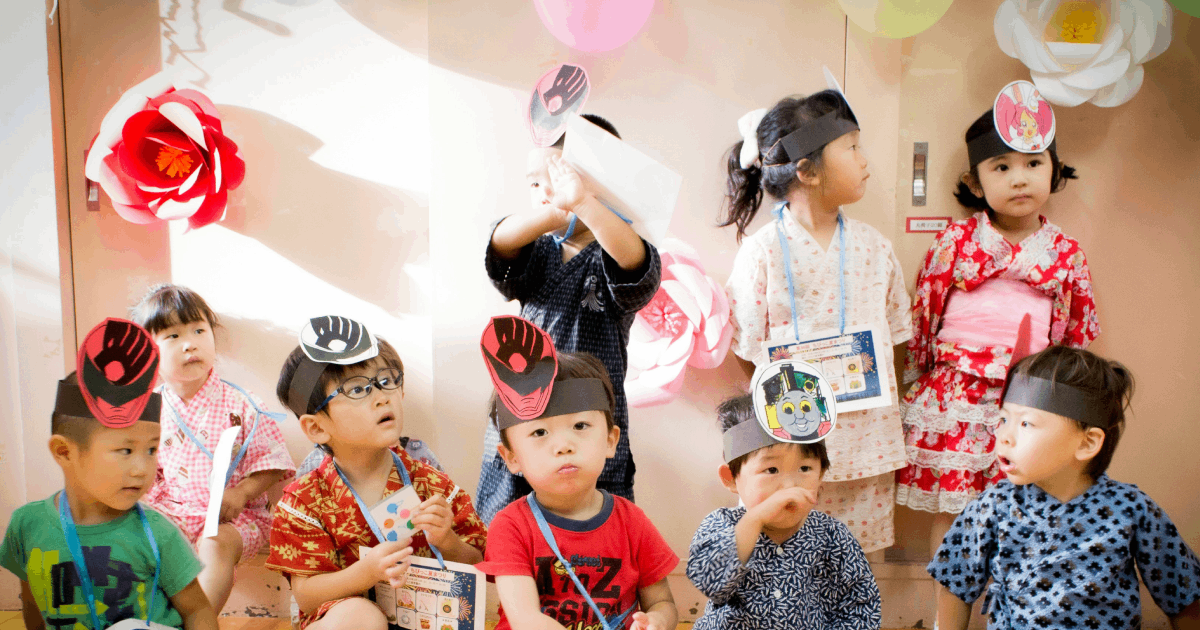

Tips for Teaching Kindergarten in Japan

Teaching in a kindergarten in Japan can be challenging but also rewarding. A kindergarten teacher should be energetic and love children. They must be able to balance being fun, but also stern when needed.
There’s also a big challenge. Young students do not understand the significance of learning a second language. To them, it is something new that they get to learn from someone who isn’t Japanese. The more fun we can make it for them, the more they want to learn and the more they want to use and speak the language. So, it is important for us as ALTs to create lessons that make students enjoy and embrace English.
Kindergarten lesson planning in Japan
Just like teaching in Elementary or Junior High school, there needs to be a lesson plan or structure. This helps to keep a routine that is good for young learners.
A kindergarten ALT is the main teacher (T1) for lessons. This means they are responsible for planning and preparing the lesson materials. But ALTs won’t be alone. The Japanese teachers are there to monitor and help control the class. Also, they are happy to help with any demonstration of activities if needed.
The lesson plan/structure will need to match the lesson length. Some lessons are only 20 minutes, while others are as long as 40 minutes. Also, we recommend researching what materials students are allowed at each school. This will help planning lesson activities.
How do I keep the attention of young learners?
Young students’ attention spans can very. If they are not stimulated or are not focused, they will get bored and irritable. So how can you keep them active and engaged?
The best options are singing, movement, and fun games. These techniques make learning a language a positive experience. Songs are something all students enjoy. You can add dance moves to help maintain their interest and get them active! Songs can also help with repetition of vocab and instilling newly- learnt vocab. It can also be useful as revision. Games are always enjoyable and can create a good environment for students to learn teamwork. Just be careful not to use competition at this age. Kindergarten students can be sensitive about winning and losing concepts. Games also give students the chance to learn without the fear of possible failure.
Games or activities for Kindergarten in Japan
Story Books
Young students love story time. However, ALTs have to be careful what story they choose. Are they relevant to what is being taught? How long or short is the story? How simple or complicated is the story? Can you gesture out the story for it to be interesting for students? Is there any repetition in the story that allows students to join in? Also be careful of the size of the book, as students will want to look at the pictures as well.
Hot Potato
This can work well with smaller classes. (Too big a class, and the students waiting for their turn might get bored or distracted). Students pass a ball or beanbag along the line after doing what the ALT has asked of them. For example, saying one of the words learnt in that lesson, or for older students, to ask or answer a question. This can be timed, or until every student has had a chance.
English Songs
Songs related to the topic being taught are always great. Seasonal songs are also wonderful, and can be used as a warmup song at the beginning of the lesson. Try to use songs that are simple and easy for students to follow along to. Song lyrics that are too fast will not be enjoyable for students as they won’t be able to sing along. Songs that encourage movement or have specific dance moves are memorable for students.
Movement Games
Young students love to move, so creating simple games that get them active is a bonus. For example, ask students to find things in the classroom that are related to the topic. Ask students to move from one side of the classroom to the other. Also, try using gestures to say the target vocab. In other words, let your creative juices flow and think of simple yet active actions and games.
Remember, if you are having fun, the students are having fun. Don’t be afraid to act like a kid yourself. The goal is not for students to become fluent english-speakers as soon as possible. The main goal is to help students become engaged and interested in learning and using English, with and without mistakes.
All in all, remember these M.E.R.I.T.S
• Movement
• Enjoyment
• Repetition
• Immersion
• Talking
• Songs
Good luck and have fun!
Author: L.M – Saitama ALT
Are you searching for Kindergarten or ALT jobs in Japan? Please visit our APPLY page for more information.






